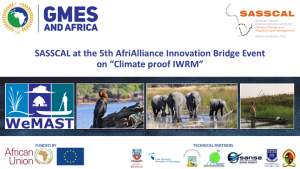
The 5th AfriAlliance Innovation Bridge Event (IBE) on “Climate proof IWRM” was held on Thursday, 29 October 2020. The online conference was hosted as part of the 21st WaterNet Symposium. The main objective of AfriAlliance Innovation Bridge Events (IBE) was to serve as a networking platform for universities, science service centres and organizations in water and climate change with potential collaborators, funders and investors to facilitate commercialisation, awareness and better uptake of their innovations.
The conference addressed social innovation and its various dimensions gathering diverse stakeholders across all levels of government and sectors of climate, water, environment, sustainability and innovation. The session consisted of technology exhibitions, and a follow up plenary discussion on fostering technological innovations for further development, uptake and commercialization.
Prof. Jean-Marie Kileshy, Executive Manager of WaterNet, officially opened the event. During the opening session, Prof. Jean-Marie highlighted that the sharing of social innovation and experience is fundamental to address the challenges of climate change and water resources. He emphasized the importance of international cooperation and the need for knowledge sharing across the continent and from Europe to have better solutions to fight against climate change and water related issues.
During the event, Dr Jane Olwoch, SASSCAL’s Executive Director made her presentation on the initiative overview of Wetland Monitoring and Assessment Service for Transboundary Basins in Southern Africa (WeMAST). WeMAST is an initiative of the GMES and Africa Support Programme, and is funded jointly by African Union and European Commission.
The WeMAST initiative will design and develop an integrated platform for wetland assessment and monitoring that will support sustainable management of selected transboundary river basins. The platform to be developed will integrate existing data products and tools to implement a sustainable wetland management system.
Dr Olwoch in her presentation highlighted the importance of wetlands, as they are highly productive and biologically diverse ecosystems that contribute significantly to livelihood and economic development. However, sustainability of wetlands in Southern Africa are threatened from human activities and natural phenomena such as pollution, over utilization, human settlement, land use and Climate Change. Dr Olwoch further highlighted that the WeMAST products and services i.e. inventory of wetlands, flood mapping, vegetation dynamics, etc. will support sustainable Wetland Assessment and Monitoring Services to promote policy implementation and management practices in SADC (Southern African Development Community). The use of satellite earth observation data provided by the European Union’s Earth observation programme Copernicus programme was highlighted in her presentation.
Dr Olwoch concluded her presentation by highlighting the strong capacity development components of WeMAST that is being facilitated by the university partners of the consortium to create skilled students, ensuring the potential of earth observation technology and methods to fully be recognised and explored by decision makers for sustainable wetland management in Southern Africa.
In his concluding remarks, Prof. Jean-Marie Kileshy acknowledged all involved participants from various backgrounds and highlighted the diversity of the conference attendees such as innovators, funders, universities, science centres, investors, etc.




